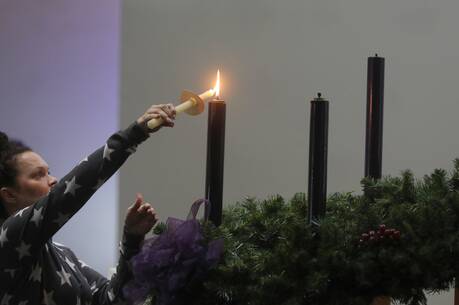What, Me Become a Slave?
Often the good news of Jesus Christ is turned into good advice, when the emphasis is placed on what we should do rather than what God has done for us. Today’s readings resound with exclamations of the saving love of God. Isaiah heralds the servant who through his suffering will justify many, which the church applies to Jesus. The Letter to the Hebrews speaks of a high priest who is able to sympathize with us in our weakness because he has been tested in every way, though sinless, and so we can confidently hope for God’s mercy. The psalm sings beautifully that of the kindness of the Lord the earth is full. The Gospel reading (the longer form is preferable) concludes the Markan journey to Jerusalem, during which Jesus repeatedly spoke of his imminent suffering, only to be misunderstood by his disciples. This rhythm culminates in the desire of James and John for positions of power and the jealousy of the Twelve, which is countered by Jesus’ own adoption of the role of Isaiah’s servant as the Son of Man, who gives his life as a ransom for many. Today’s readings are Christmas in advance, as we celebrate gifts almost too startling to believe.
I remember vividly my ordination retreat in May 1964. The director began every reflection with Mk. 10:45, The Son of Man came not to be served, but to serve and to give his life as a ransom for many. He stressed constantly that our priesthood was to be a priesthood of service in a servant church. The service was not simply to be available, but a service that brought liberation to people. In the time of Jesus, ransom was the price paid to free someone from slavery; sometimes the ransomer offered himself as a substitute for the slave. Jesus’ offering was to be a liberating offering. In almost 37 years as a priest I have come to see again and again that this liberating service plays out in the lives of priests, but is also constantly realized in the myriad forms of service by the priestly people of God for Christ plays in ten thousand places,/ Lovely in limbs, and lovely in eyes not his (Gerard Manley Hopkins).
While the good news may not be good advice, the gracious acts of God call for a response of gratitude and loving service. Mark states this, but also offers a counter-vision embodied in the ambitious and squabbling disciples. After Jesus’ most explicit prediction of his suffering, James and John skip the thought of suffering and ask to be vice-regents with Jesus when he comes into his glory. Jesus answers that they may not receive this request, but they will follow his way of suffering. Missing the point as usual, the other disciples become riled up, and Jesus gives them a lesson on what power means in his community.
Gentile rulers lord it over their subjects, and their great ones make their authority felt (throw their weight around). But it shall not be so among you, responds Jesus, a sentence that should be emblazoned on every letter of appointment to a position of authority in the church. Rather, greatness in Jesus’ community is a greatness of service. Gentile, that is Roman, power was exercised primarily through force, intimidation and an elaborate network of patronage that tried to assure absolute loyalty to the emperor. The way power is maintained in the secular world of rulers and ruled is anathema to true followers of Jesus.
Scripture is both a beautiful tapestry of God’s loving deeds and a mirror that enables us to gaze at our own lives. Today’s liturgical readings, especially the Gospel, console us with a love of God that makes issues of power and dominance irrelevant. Yet they also warn the church against the misuse of power. Lording it over and use of the heavy hand of authority are not to characterize the community of disciples. The slavery mandated by Jesus is a loving service of liberation for others. It shines forth in parents at the bed of a sick child, in a spouse caring for another with Alzheimer’s disease; in people giving their lives to protest injustice and in priests and pastoral teams serving local churches. This service draws on a deeper source of power epitomized in St. Paul’s statement, I will gladly glory in my weakness that the power of Christ may dwell in me (2 Cor. 12:9, my trans.)
This article also appeared in print, under the headline “What, Me Become a Slave?,” in the October 14, 2000, issue.







